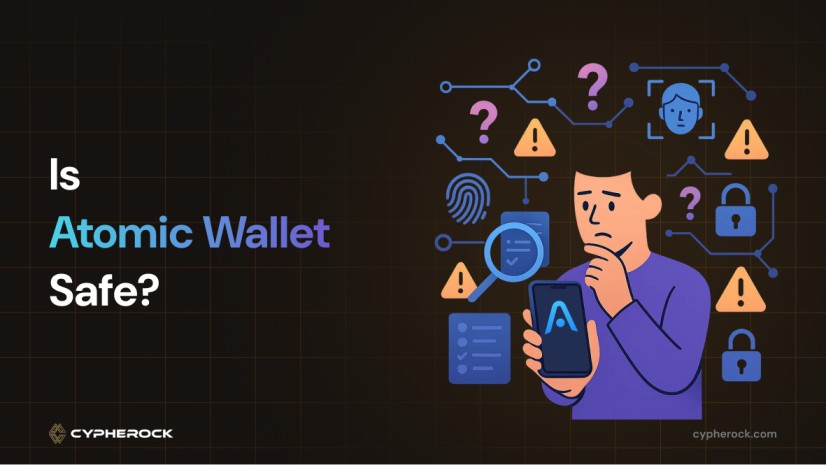

In 2025, wallet security has never been more urgent. Hacks cost people millions. A simple mistake—clicking the wrong link or forgetting a backup—can wipe out years of savings. Gone forever.
Atomic Wallet promises to solve all that. It supports hundreds of coins, lets you swap and stake in one place, and claims you control your private keys. But does it really deliver on safety?
Throughout this article, I’ll walk you through everything I found—good, bad, and surprising. I’ll show you what stands out, what feels risky, and whether it's a smart choice for most users.
By the end, you will know exactly what Atomic Wallet can do—and whether it suits your security needs.
Atomic Wallet is a non-custodial crypto wallet, meaning you control your private keys. No one else. It works without needing a third party to store your assets for you.
It supports more than 500 cryptocurrencies. You can manage Bitcoin, Ethereum, Solana, and many others—all in one app.
It runs on Windows, macOS, Linux, and is also available on iOS and Android. You can use it on your computer or phone.
Atomic Wallet also has a Web3 DApp store, letting you access decentralized apps directly from inside the app. You don’t have to leave to use them.
This wallet is built for people who want to be in control. You hold the keys and decide everything—from swaps to staking. It’s not for those who prefer all the work done behind the scenes.
You own your private keys, and they stay encrypted on your device. Atomic Wallet never sends them anywhere else.
You can swap coins inside the app. It uses services like Changelly and ShapeShift. That means you don’t need a separate account. But be aware—fees can be high.
You can stake coins like ADA, SOL, BNB, and NEAR. That means you lock your coins to earn rewards.
You don’t need different wallets for each crypto. Atomic Wallet can hold most tokens and coins you want.
A built-in dApp browser lets you interact with Ethereum and Binance Smart Chain apps safely.
Whether you use desktop or mobile, the design is easy to navigate. You can find features with a few taps or clicks.
When you set up Atomic Wallet, you receive a 12‑word recovery phrase. This phrase is your only backup. No one else has it.
Your phrase and keys are encrypted and stored locally. That means they’re on your device, protected by your password.
Atomic Wallet doesn’t “hold” your crypto. Your coins stay on the blockchain. The wallet helps you view balances and make transactions.
You can buy coins with a card, swap between tokens, and stake your crypto—all without leaving the app.
These features make Atomic Wallet an all-in-one tool. But remember, keeping your private data safe is still your job.
Yes, for the most part:
But:
Overall, it’s easy enough for beginners, but also robust enough for casual investors.
Your keys never leave your device, and they’re encrypted.
You set a strong password to open the wallet and to make transactions.
The 12‑word seed is your only way to restore access. Losing it means losing your crypto.
You don’t need to give an ID or email. Atomic never collects your personal info.
You can swap and interact with apps without sharing data. Your identity stays private.
These features give you full control—but also full responsibility.
You cannot connect a Ledger or Trezor. All keys stay on your device.
There’s no extra layer of security like SMS or app-based verification.
If your device is infected, someone might access your phrase or keys.
App glitches may slow transactions—especially during heavy network use.
If you lose your recovery phrase or device, your funds are gone. No recovery options.
These risks place the burden squarely on you.
MetaMask is focused on Ethereum-based networks. It lets you set network fees and is browser-based. Atomic Wallet supports more coins and is app-based, but MetaMask works better for complex dApps.
Trust Wallet supports similar assets and has staking. But Trust Wallet has hardware wallet support and runs under Binance’s backing.
Exodus is similar—easy interface and built-in exchange. But Exodus has Trezor support for extra security.
Cypherock X1 offers hardware-based security with Shamir Secret Sharing. That means your key is split across multiple parts. No need for a 12‑word phrase, and no single point of failure.
Choose Atomic Wallet if:
Avoid it if:
For high-stakes security, consider Cypherock X1.
These steps help reduce risks in a hot wallet model.
What Atomic Wallet does well:
Where it falls short:
Atomic Wallet is fine for privacy-minded users with small to mid-sized holdings. You must learn to protect your keys.
But if you store crypto long-term, or want fewer risks, Cypherock X1 is a better choice. It lets you keep control, without relying on one phrase or device. Your key is split and protected, letting you recover even if parts go missing.

Ready to protect your crypto like a pro?
Check out how Cypherock X1 can help you secure your future - Explore now!.
Connect with us:
Twitter: @CypherockWallet
Telegram: Join the Community
